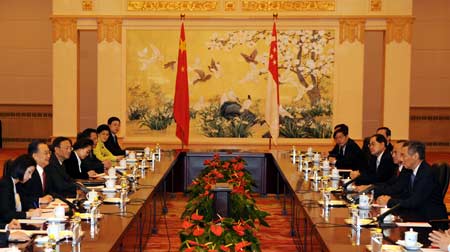Singapore companies to benefit from updated CSFTA
Just sixteen months after Singapore and China inked the China-Singapore Free Trade Agreement (CSFTA), the two countries decided to review its relevance to needs of its business community.
In April 2010, just sixteen months after Singapore and China inked the China-Singapore Free Trade Agreement (CSFTA), the two countries decided to review its relevance to needs of its business community. Another meeting ensued between May and June this year, culminating in a joint-resolution to the following three changes:
- China will make it easier for Singapore companies to provide ASEAN-China FTA Package 2 Services such as non-academic as well as badminton training, computer reservation, transportation services;
- China will accept Singapore companies’ method of shipping interchangeable finished products together and accord tariff concessions accordingly and;
- Singapore Custom’s practice of stamping “Issued Retrospectively” on the preferential certificate of origin three days after the date of shipment will be acknowledged by China, thereby ensuring that Singapore companies enjoy tariff concessions.

Entrepreneurs considering Singapore company formation are set to benefit from the enhancements in the updated agreement. Singapore investors, SMEs and MNCs alike stand to enjoy not only access to a new variety of service sectors in China’s vast market; they are now guaranteed to enjoy tariff concessions as both economies commit to bridging gaps in the agreement. In gist, the move proves that both economies are keen to cater to the needs of members operating across both business landscapes and install mutually-beneficial processes to ensure its efficacy.
Prior to these amendments, the CSFTA ensured that 95% of Singapore’s exports to China worth over S$18 billion were tariff-free. Exporters of petrochemicals, processed foods and electronics benefited the most. In terms of results, bilateral trade between Singapore and China increased significantly during a time when the world economy was struggling to pick itself up. According to International Enterprise Singapore (IE Singapore) total trade between China and Singapore rose from S$75.7 billion in 2009 to over S$95.3 billion in 2010. Therefore, China was Singapore’s 2nd largest trading partner last year. With the new changes in place, bilateral trade is expected to grow further even as regional trade slows down.
To bolster the signing of this updated protocol, Singapore has also inked ten MOUs (memorandum of understanding) at the recent 4th Singapore Tianjin Economic and Trade Council meeting. This agreement follows the recording of US$1.6 billion in bilateral trade last year as well as a robust 12% y-o-y increase in bilateral trade worth US$720 million as of May this year. Singapore is Tianjin’s fifth largest investor by end of 2010, having invested in its largest international project yet – the Tianjin Eco-city.
Other than these agreements, Singapore companies are also able to tap high-potential and emerging Asian economies surrounding Singapore. They can also rely on Singapore’s prosperity brought about by a transparent and efficient jurisdiction that willingly commits to innovation and business catalyzing frameworks to bolster the growth of companies of all sizes. Companies interested in registering a Singapore branch or setting up a Singapore subsidiary can also enjoy 24-hour company incorporation, one of the world’s lowest corporate taxation and endeavors to lower regulatory burdens for Singapore companies. Altogether, these factors cement Singapore companies’ ability to jump start their business in Asia.
